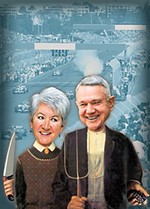Point Austin: Who's Blue?
What we've learned thus far
By Michael King, Fri., May 9, 2008

After Saturday's vote (be there or be square), you might think you've escaped the electioneering gauntlet at least until this fall, but don't exhale too soon. The City Council Place 4 race, with three very strong candidates and six in all, will inevitably produce a June 14 face-off, although it's anybody's guess which two of Laura Morrison, Cid Galindo, and Robin Cravey will be left standing on Saturday. To judge only from the increasingly polarized Place 3 rhetoric, a run-off also looks quite possible between incumbent Jennifer Kim and Randi Shade, with lesser-known Ken Weiss perhaps peeling away just enough votes to keep the higher-profile candidates under 50%.
So we all have another month of Austin-weird mudslinging to entertain us – where the mud slung is occasionally real mud, or at least polluted groundwater mixed with mutual accusations of being seen in public with (or without) people of the wrong (or right) professional persuasion – e.g., "developers," "political consultants," "insiders," "outsiders," "environmentalists," "the special interests," "neighborhood activists," etc., etc. I've put all those terms in dubious scare quotes, because Austin's political language is a lot like that of Humpty Dumpty, who famously declared, "When I use a word, it means just what I choose it to mean, neither more nor less."
That's a good principle to remember when attempting to understand local political rhetoric, because a given term can often have two different, even precisely opposite, meanings, something rather difficult to manage in ordinary workaday language. But the basic methodology is easy to grasp: A given word or phrase means one thing when used in connection with a candidate you support and something quite different when applied to a candidate you oppose.
It's as simple as "black" and "white."
A Campaign Lexicon
In the interest of confounding you even more, I've put together a very basic lexicon of Austin campaign rhetoric. It's hardly exhaustive, but once one understands the principles involved, the careful lexicographer can spot the logical legerdemain operating in every campaign commercial or press release.
"Developer": While this term literally connotes an investor/manager who might arrange a broad variety of building projects across the city – maybe even in your "neighborhood" (see p.20) – in local political discourse it has only one, extremely negative meaning: someone who built (or proposed) an evil construction project that will inevitably 1) cost more than you can afford, 2) obscure your front porch from a Capitol-view corridor, 3) "pollute the aquifer," or all three. A "developer" is never the guy who built your house or apartment, and should a "developer's" name turn up in your candidate's list of donors, he becomes simply a "supporter."
"Neighborhood": Just as "developer" is always and everywhere a negative term, "neighborhood" is always and everywhere a positive term. Your candidate "supports the neighborhoods"; his or her opponent "opposes the neighborhoods." This remains true even of those "neighborhoods" in those other, unpleasant parts of town (e.g., "over the aquifer"), which are filled with people of whom you disapprove. If their "neighborhood association" (or even your own) has proposed or supported something you oppose, they're not really the "neighborhood" – they're "special interests" (see below) attempting to "gentrify/destroy" the "neighborhood" and the "public interest" (ditto). Better yet, start your own, competing "neighborhood association" – now you're the "neighborhood," and they're not.
"Public interest": Proposals supported by your candidate.
"Special interest": Proposals supported by your candidate's opponent.
"Public safety": When used by your candidate (or Statesman editorialists), the term "public safety" is a cost-free "public interest" that magically expands when we need more, because we like it; when used by your candidate's opponent, it is an unconscionable budget-busting taxpayer burden supported only by the greedy "special interest" "public safety" unions.
Master Class
You get the idea. In the right mouth (or press release), virtually any term can take on these chameleonic qualities, meaning one thing at one moment and an entirely opposite thing a moment later. Start (like Humpty Dumpty) regularly using words this way, and before you know it, they'll mean anything you like, any time you like it.
Take, for example, the word "Democrat." A few weeks ago, in an effort to discredit Place 4 candidate Galindo, a group of "Concerned Travis County Democrats" distributed a letter suggesting that Galindo is not, as he claims, an "independent" who now supports Dem presidential candidate Barack Obama but is instead a stealth Republican who voted in the 2004 GOP primary and, even worse, in 1995 donated to the campaign of then-GOP Sen. "Phil Graham" (you'd think a bunch of big-shot Democrats would remember how to spell "Gramm" – no doubt they also prefer to forget Gramm was himself once a Democrat).
Somehow, these Dem stalwarts (in what is officially a nonpartisan election) neglected to mention that their own preferred candidate, Morrison, has been no great shakes as a Democratic firebrand – and that, if that's now the defining standard, they should all have long since lined up to endorse and vote for Cravey, a frontline Democratic activist for many years. Curiously enough, several names of these "concerned Democrats" are also listed as supporters for the fall election of Precinct 3 county commissioner candidate Karen Huber. No disrespect to Huber – but as I recall, she was a declared, true-red, and contributing "Republican" before she became a true-blue "Democrat."
Or is that no longer the point of political action in the first place – to persuade other people, especially those who have disagreed with you in the past, to come over to your side of a public-spirited argument? Apparently not, at least among the practitioners of Austin's conventional political discourse, where the "new politics" of Obamamania seems not yet to have filtered down to many of the old, politics-as-usual professional politicos.
"The question is," said Alice, "whether you can make words mean so many different things."
"The question is," said Humpty Dumpty, "which is to be master – that's all."
There you have it – what we've learned thus far about the widespread rhetorical principles underlying the Austin campaign dictionary of political terms. I suppose it's just too much to wish for, that those who reflexively share the linguistic perspective and methods of Humpty Dumpty might one day also suffer his eventual fate.
Got something to say on the subject? Send a letter to the editor.










